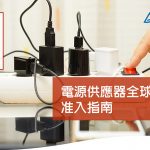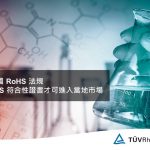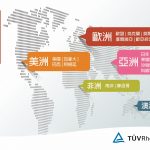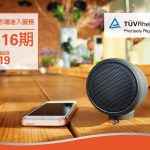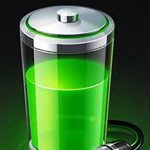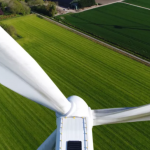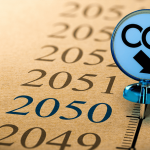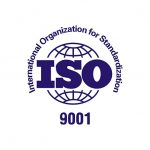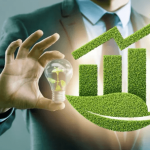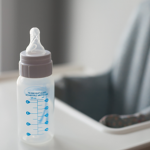How and Why our Biobased Service can proof your Green Initiatives 生物基服務如何助您突顯綠色
- Biobased 20 – 50 %
- Biobased 50 – 85 %
- Biobased > 85 %
- 生物基 20 – 50 %
- 生物基 50 – 85 %
- 生物基 > 85 %

“Plastic” refers to a material processed and formed with high molecular weight synthetic resin as the main component, along with appropriate additives such as plasticizers, stabilizers, antioxidants, flame retardants, additives, colorants, etc. Starting around the mid-20th century, people found they could not live without “plastic” materials, and unknowingly entered the unprecedented “plastic era”.
Although plastic brings us many conveniences in life, it also brings the problem of plastic waste, which is one of the biggest impacts brought by mankind on the environment. Different types of plastics take different lengths of time to decompose in the natural environment. PE plastic bags decompose in about 10-12 years, nylon cloth and plastic bottles need 30-50 years, and PVC will last forever.
Nowadays, more and more people are paying attention to environmental issues, and many consumer product brands and manufacturers are constantly developing and researching environmentally friendly products, such as plastics made of plant-based or biodegradable materials. This trend has gradually affected the well-known large brands. In recent years, many sports shoe brands have launched bio-based shoes, including Nike and Anta, which have used bio-based materials transformed from coffee grounds or bamboo to make their shoes. However, do you know what a biobased material is?
Biobased /bioplastics are plastics derived from renewable biomass sources, such as vegetable oils, corn starch, pea starch, or microbiota. Common plastics such as petroleum-based plastics are refined from petroleum. These plastics rely more on fossil fuels and generate more greenhouse gases. Some but not all bioplastics are biodegradable. Bioplastics can be composed of a variety of materials, including starch, cellulose, or other biopolymers. Some common applications of bioplastics include packaging materials, tableware, food packaging, and medical materials.
Testing companies can test the percentage of bio-based carbon compared to fossil carbon in a final product in accordance with ASTM D 6866 – “Standard Test Methods for Determining the Bio-based Content in Solid, Liquid, and Gas Samples Using Radiocarbon Analysis”. A bio-based value of 75% means that 75% of the organic matter in the product is bio-based and 25% is petroleum-based.
Our certification mark for your biobased products
With the successful completion of the testing and the positive conformity assessment of the submitted application documents, we issue you a certificate and you receive the right to use the “DIN-Geprüft biobased” certification mark as well as the corresponding registration number.
Depending on the proportion of biobased carbon, the quality levels are classified as follows:
Your certificate has a validity of six years and can be extended through corresponding monitoring, supplementary and special tests and assessments as well as a request for extension. If your biobased product is compostable, you can also confirm this with our compostable mark.
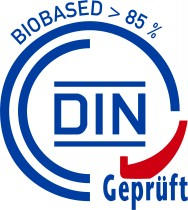
As experienced experts, we are the right partner for the impartial testing and certification of your biobased products. Our globally recognized certification marks ensure that you obtain the trust of the markets as well as your customers.
Recent news
TÜV Rheinland Awards Industrial Composting Certification to APP Ningbo Asia Pulp & Paper Co., Ltd.
Related services
塑膠是指以高分子量的合成樹脂為主要組分,加入適當的添加劑,如增塑劑,穩定劑,抗氧化劑,阻燃劑,添加劑,著色劑等,經加工成型的塑性(柔韌性)材料。直到20 世紀中葉,人類情有獨鍾地愛上「塑膠」材料,不知不覺地邁入歷史空前的「塑膠時代」。
塑膠雖然帶給我們許多生活上的便利,但也帶來塑膠垃圾的問題,是人類帶給環境最大的衝擊之一。不同種類的塑膠,在自然環境下所需分解的時間也不同, PE 塑膠袋大概 10-12 年可以分解,尼龍布跟塑膠瓶需要 30-50 年,至於 PVC 則會永世長存。
在現今世代,越來越多人關注環保的議題,不少消費品的品牌商及製造商都在不斷開發和研究環境友善的產品。有越來越多原以塑膠製作的商品,改採用植物性或是可生物分解材料製作,這股趨勢從小眾品牌群體開始漸漸影響到眾人熟知的大型品牌。近幾年,不少運動鞋品牌推出生物基材鞋,例如耐克或安踏,使用咖啡渣或竹子轉化的生物基材製作鞋子。然而,你知道什麼是生物基材嗎?
生物基材/生物塑料(英語:Bioplastic)是來自於可再生的生物質來源的塑料,如來自於植物油,玉米澱粉,豌豆澱粉或微生物群。常見的塑料,如石油基塑料是從石油中提煉,這些塑料更多地依賴化石燃料並產生更多的溫室氣體。一部分但不是全部的生物塑料是可以生物降解的塑料。生物塑料可有各種各樣的材料組成,包括:澱粉、纖維素或其他生物聚合物。一些常見的生物塑料的應用包括包裝材料、餐具、食品包裝和醫用材料。
檢測機構可以根據ASTM D 6866 –“使用放射性碳分析測定固體,液體和氣體樣品中生物基含量的標準測試方法”測定最終產品中所含新生物基碳與化石碳的比例。 75%的生物基值就意味著產品的有機物質中,75%是生物基和25%是石油基。
TÜV萊茵生物基產品認證標識
TÜV萊茵可以依測試結果和提交的申請文件依據生物基碳比例含量,出俱生物基認證標識及相應註冊號。
根據生物基碳的比例,質量等級分類如下:
您的證書有效期為六年,可以通過相應的監測、補充和特殊測試和評估以及延期請求進行延期。如果您的生物基產品是可堆肥的,您也可以申請使用TÜV萊茵的可堆肥標識。

作為經驗豐富的專家,TÜV萊茵是您的生物基產品進行測試和認證最佳的合作夥伴,確保您獲得市場和客戶的信任。
相關新聞
相關服務
Contact us
Carmen Zhou
86 755 8268 1578
Carmen.Zhou@tuv.com
Miles Ding
86 755 8268 1559
Miles.Ding@tuv.com
熱門分享





